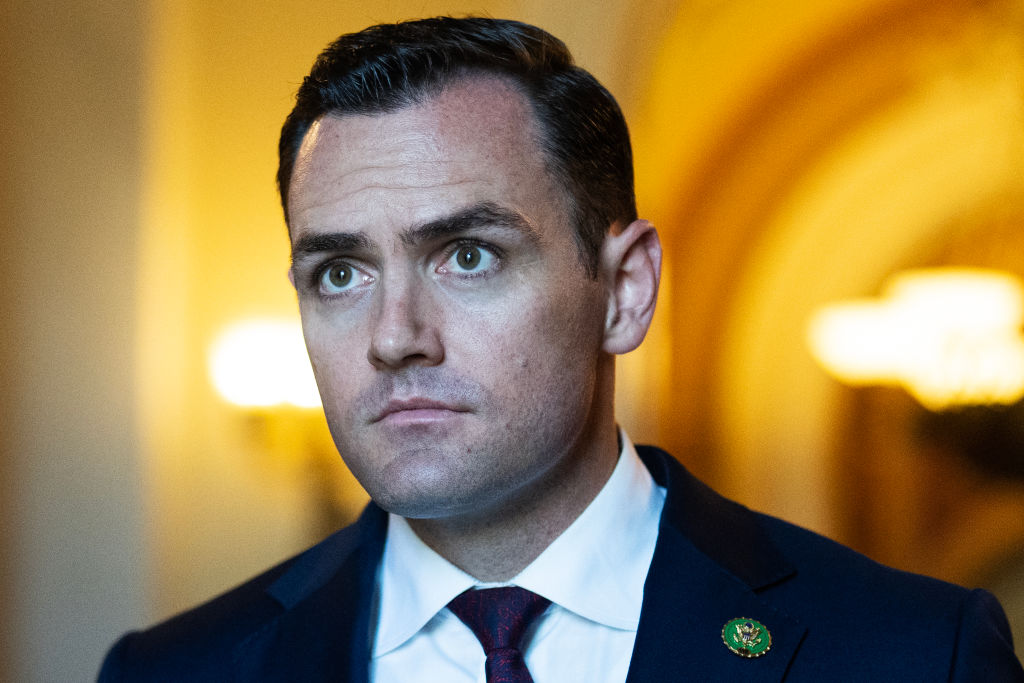Do you have opinions about tonight’s Republican presidential primary debate? So does Rep. Mike Gallagher, the Wisconsin Republican who chairs the House’s select committee on competition with the Chinese Communist Party. He spoke with The Dispatch Tuesday about what he’s hoping to see—a serious national security debate—and his belief that Donald Trump shouldn’t be the GOP nominee. The conversation below has been lightly edited for length and clarity.
Haley Byrd Wilt: Hi, Congressman. Is Donald Trump going to be the nominee?
Gallagher: I’m not prepared to concede that point.
Why not?
I don't think he should be the nominee, if for no other reason than I think a younger candidate would make sense—a generational shift. Particularly given how old Biden is. I mean, Biden is so old, he’s not even a boomer. He's a member of the silent generation. He's older than the People's Republic of China itself. And Trump will be as old as Biden was when he took office, when he takes office. And by the way, I think a younger candidate would just win, you know? Whereas Trump lost to Biden in 2020. Yeah, he's got a dominant position now, but the field needs to consolidate. I was on a presidential campaign in 2016, so maybe that reflects my bias, but the field remained fractured in 2016, which redounded to Trump's advantage. If you want a competitive primary, the field really needs to consolidate. That's actually what worries me about this debate. I don't know who's determining the standards for getting on the debate stage, but the culling of the field needed to begin yesterday.
Have you endorsed anyone?
I have not. But I do think today, if you had a DeSantis/Haley ticket, it would be unbeatable. It would speak to all factions of the Republican Party, which is a big tent party. You’d have two governors with foreign policy experience, one of which is a veteran. One of which was the ambassador to the U.N. I mean, they would crush—just crush—Biden/Harris. I don't think it'd even be close. So if the field consolidates, it makes something like that possible. They've both been very strong on China.
You're mentioning very pragmatic reasons not to support Donald Trump—he didn't win and he's old. But, I mean. There's also other reasons. I remember you posting a video from your office on January 6 asking him to tell his supporters to stop.
[sarcastically] I don’t recall this.
If he is the nominee, do you think he should be president? Will you support him?
I’ve already said I don’t think he should be the nominee. I'm not prepared to concede that point just yet. Obviously, I'm not going to support Biden. I intend to support the nominee. But let's have a primary. It shouldn't be a coronation. I want to win. I've seen the price of losing for the last two years, and the price is high, in actual dollars and in terms of foreign policy. So I'd like the most conservative candidate who can win.
Donald Trump’s China policies were chaotic, and he frequently praised Xi Jinping. John Bolton, his former national security adviser, said Trump even told Xi he agreed with the Chinese government’s concentration camps in Xinjiang, where Muslim minorities are indefinitely held in horrific conditions without cause. Are you concerned about Trump’s approach to China if he is the nominee?
The Trump administration was divided, right? You had smart hawks that I respect, like H.R. McMaster and Matthew Pottinger, who I think had a clear-eyed assessment of the CCP and of Xi Jinping. But then you also had a finance faction, I think led by the Treasury Department, which had a far more dovish view on China. And Trump himself seemed to think that his personal relationship with Xi Jinping was the, like, sine qua non of geopolitical success. I remember the first time I got called to the principal's office, i.e. the White House, was when I had the amendment to the defense authorization act that would've imposed the so-called death penalty on ZTE, a Chinese telecommunications company. This is where we're having this debate about Huawei and ZTE. Trump himself made the pitch that we needed to water down and abandon the amendment, because Xi Jinping had called him and said, you know, “Don't do this.”
ZTE is founded in the town that Xi Jinping's from, incidentally, and they wanted to pursue this sort of trade deal with China. The “phase one” trade deal with China was not successful. It was a failure. China committed to buying something like $200 billion of U.S. imports, and like many a communist promise, it vanished like leaves on a turbulent sea. It’s gone. Like it didn’t happen. So I think that's a fair critique of Trump's approach to China. His recent rhetoric regarding the defense of Taiwan did inspire a lot of confidence, but we'll see. I also think the military rebuild that he's claiming credit for didn't happen. That's actually the most important thing. The Trump administration had a good national defense strategy. But we just didn't implement the defense portion of that strategy. We had another failed pivot to the Pacific. The 355-ship Navy did not emerge. You can blame that on Pentagon bureaucracy and slow rolling and all that stuff, but still, the president needs to be personally involved, needs to select a secretary of defense and empower him to get it done. And that didn't happen.
Would you serve in a future Trump administration?
This is not something I think about, to be honest with you. But my view is if the president asks you to do something like serve, you have to do it. And so that holds true for a Republican or Democrat president. I would stick to that view. I think it sort of depends on what the president's asking you to do, and maybe you just sort of have to add in a layer of could you actually be successful in the job. But, you know, I'm a sucker for defending America from communist aggression, so I don't need a fancy title to do it.
What do you want to see in tonight’s debate?
I'm not saying we need, like, physical combat onstage to eliminate people, but, um, you know. I'll just leave it at that. On a serious note, I just want a serious national security debate. You're at the Reagan Library. I think it should be informed by the Reagan administration's approach to the world stage. There's meaningful debates within the party right now—I think they may be frustrating some people—but I actually think they’re healthy, and they're not new, right? We've always had this tension in the Republican Party between isolationism and internationalism. I actually think it's a productive tension. So on China, the most important question—beyond communicating a clear assessment of the threat and a sense of optimism to the American people that we're the good guys, we deserve to win this new Cold War, channeling Reagan in that regard—is the military question. What is your plan, beyond sort of invoking Reagan's name and peace through strength? What is your actual, coherent plan for cutting through the Pentagon bureaucracy and building a more lethal military? And oh, by the way, confronting a historic recruitment crisis we have right now that threatens the very existence of the all-volunteer force.
When it comes to economics, the Biden administration just released an executive order designed to limit the flow of U.S. capital to certain sectors in China. Certain Republicans don't want any restrictions. They’re more sympathetic to Wall Street's position. I think it doesn't go far enough. I think that's a healthy debate to have, the nature of guardrails on outbound capital flows to ensure that we're not funding our own destruction by allowing Americans to invest in Chinese military companies.
The other question that I know is falling off the radar, but I think is still super important, is this question of TikTok. TikTok could become the most dominant media platform in America soon. Young Americans get news from TikTok. I think it's a really bad idea to allow a CCP influencer-controlled app to be the dominant media platform in America, but it's a very hard issue to deal with. The Trump administration tried, and they ran into a buzz saw. The Biden administration balked at doing anything about it. And now Republicans are gun shy because the Warner effort in the Senate was too broad, and it scared a lot of people off. So I guess the question would be, do you think it should be banned, or a sale forced? And how will you do it? How will you succeed where Trump failed and where Biden fears to tread?






Please note that we at The Dispatch hold ourselves, our work, and our commenters to a higher standard than other places on the internet. We welcome comments that foster genuine debate or discussion—including comments critical of us or our work—but responses that include ad hominem attacks on fellow Dispatch members or are intended to stoke fear and anger may be moderated.
With your membership, you only have the ability to comment on The Morning Dispatch articles. Consider upgrading to join the conversation everywhere.